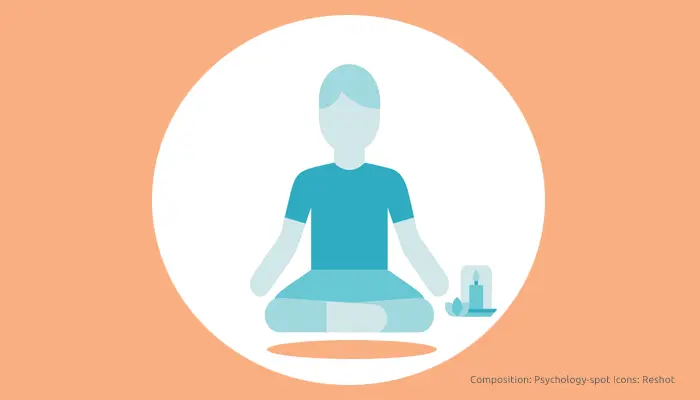
Stress has become a constant in modern life. We all have to deal with a myriad of stressful situations, from small setbacks like traffic jams to more serious problems like illness or a relationship conflict. Regardless of its cause, the result is the same: stress floods our body with hormones like cortisol that, in the long term, damage us.
In addition to its impact on our physical health, stress also affects our mental balance. It generates tension and anguish, makes our performance plummet and jeopardizes our dreams. Since we can’t avoid all sources of stress, we need to find healthier coping strategies and practice exercises to relax the mind.
How to relax the mind and body?
In 1970, Harvard Medical School cardiologist Herbert Benson proposed the relaxation response as an antidote to the stress response. As stress speeds up your heart rate, shortens your breath and tenses your muscles; relaxation helps us put on the handbrake to regain peace of mind. As there is an indissoluble relationship between mind and body in the response to stress, to relax we can resort to eminently psychological exercises as well as activities with a more physical component.
1. Body scanner to relieve tension
Exploring your body mentally will allow you to understand where tension is concentrated and how it affects you, as well as help you release stress and emotional distress. You just have to sit comfortably or lie on your back and mentally scan your body from your toes to your scalp. As you move from one body part to another, notice how you feel physically.
Take note of the areas where tension is concentrated and the parts of the body that are most relaxed, without trying anything. As you do this, take a deep breath and imagine the cool breath flowing over the body part you are scanning. Be aware of the sensations you are experiencing and, if necessary, repeat the process in a second moment, focusing on the most tense parts of the body.
That simple body scan will not take you more than 10 minutes and will help you relax as it is an excellent tool to release tension, pain or discomfort that you had not even noticed. If you want to make the most of this exercise to relax your body and mind, you can use some oil or body lotion specifically formulated to promote a state of well-being and relaxation, making you forget from the hustle and bustle of everyday life.
2. Give yourself a break to take a deep breath
Breathing is one of the best exercises to relax the body and mind because it activates the parasympathetic nervous system, which acts as a handbrake through the release of neurotransmitters such as acetylcholine, which reduce heart rate and blood pressure. which helps us reduce stress.
There are numerous breathing techniques. The 4-7-8 exercise, for example, is one of the simplest as it involves inhaling for 4 seconds, holding your breath for 7 seconds, and then exhaling slowly for 8 seconds.
Alternate nasal breathing has also been shown to be helpful in generating a state of active mental relaxation. By balancing the cerebral hemispheres, it has a calming and energizing effect at the same time. You just have to sit in a comfortable position with your legs crossed. Place your left hand on your left knee and bring your right hand up to your nose. Exhale completely and then close the right nostril using the right thumb. Inhale through the left nostril, then close it with your fingers. Open the right nostril and exhale through this side. Inhale through the right nostril and then close this nostril. Open your left nostril and exhale through it. Repeat the exercise ending with an exhalation from the left side.
3. Meditate to gain perspective
The daily rush and worries can cause you to lose perspective and fall into a stressful spiral. Meditation allows you to get out of that loop by observing your thoughts and emotions in a detached and non-judgmental way. In fact, science has discovered that meditating for just 10 minutes each day can significantly reduce stress and anxiety, as well as transform the neural pathways in the brain so you become less emotionally reactive and more resilient to stress.
Best of all, when you learn to meditate, you can do it anywhere, whether it’s on the subway on your way to work or on a park bench. You just have to sit down, close your eyes and focus on your breathing to disconnect from the world and find the inner peace that you need
There are different ways to meditate, although if it is the first time you try it or you find it difficult to keep your mind focused, you may have to resort to mantras. Coming from the meditative traditions of India and Buddhism, they are nothing more than a sound, like “om”, that you repeat out loud or in your mind. However, it is important that you feel the mantra you choose with full presence, it is not worth repeating it mechanically. You could even use a japamālā, a 108-bead instrument that will let you know how many times you repeat a mantra to end your meditation session. By keeping your mind occupied with the mantra, you will free yourself from the weight of worries and the tension they generate.
4. Mindfulness to be fully present
To immediately relax your mind and relieve stress or anxiety, one of the best strategies is to shift your focus from negative thoughts to the present moment. When you become aware of the present you can get rid of worries about the future or regrets about the past.
In this sense, a study carried out in the Netherlands found that brain function can change with just 8 weeks of Mindfulness. With this practice, your amygdala will become less reactive and the prefrontal cortex will gain prominence, which will allow you to better deal with problems, so you don’t get carried away by them.
Mindfulness can be put into practice in different ways. Sometimes to clear your mind it is enough to stop, slow down and enjoy the moment with all five senses alert. A more complex technique consists of choosing a quiet place where you feel comfortable and sitting up straight or lying on a mat so as not to interfere with your breathing. Next, focus on the air going in and out of the nostrils and into the lungs, imagining that with each breath you gain serenity. When certain thoughts cross your mind, do not judge them as good or bad, just observe them and focus again on your breathing. At first you will probably find it difficult, but with practice you will improve and you will gain self-control and serenity.
5. Try hydrotherapy, you will be surprised
Water could become your ally to relax your mind. Centuries ago, Hippocrates believed that water therapy could relieve fatigue, and today advocates of cold baths have multiplied, claiming it gives you energy, clears your mind and helps you better deal with stress. A study carried out at the University of Oulu proves them right: cold water baths can really improve our well-being.
The mechanism of action is not known for sure, but it is hypothesized that immersing the face in cold water may activate the parasympathetic branch of the nervous system, causing the body to relax after that stressful event, helping to calm you down. Adapting to the shock of cold water is also thought to improve people’s ability to cope with other stressful life events. For this reason, when you feel too tense, stressed or anxious, a very simple way to relax your mind is to immerse your face in cold water or put ice cubes on your wrists.
If cold water doesn’t convince you, a relaxing hot bath may help you more, especially at the end of a tiring day. A meta-analysis conducted at the Japan Health and Research Institute found that stress levels are reduced as hot water increases body temperatura, because it calms the nervous system and releases endorphins such as dopamine and serotonin that make you feel better.
Sources:
Knytl, P. & Opitz, B. (2018) Meditation experience predicts negative reinforcement learning and is associated with attenuated FRN amplitude. Cognitive, Affective, & Behavioral Neuroscience; 1-15.
Goto, Y. et. Al. (2018) Physical and Mental Effects of Bathing: A Randomized Intervention Study. Evid Based Complement Alternat Med; 2: 9521086.
Ghiya, S. (2017) Alternate nostril breathing: a systematic review of clinical trials. International Journal of Research in Medical Sciences; 5(8); 3273–3286.
Gotink, R. A. et. Al. (2016) 8-week Mindfulness Based Stress Reduction induces brain changes similar to traditional long-term meditation practice – A systematic review. Brain and Cognition; 108: 32–41.
Vandana, B. et. Al. (2011) Meditation induces a positive response during stress events in young Indian adults. Int J Yoga; 4(2): 64–70.
Huttunen, P. et. Al. (2004) Winter swimming improves general well-being. Int J Circumpolar Health; 63(2): 140-144.



